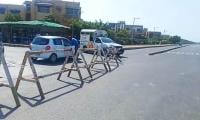Berlin: Police fired tear gas as thousands of people demonstrated in Berlin on Wednesday against a proposed amendment to give Angela Merkel’s government power to impose tougher anti-coronavirus measures.
With Germany buckling under a third wave of the virus, the amendment allowing for nationwide curbs like school closures and night-time curfews aims to end a political tug-of-war between the federal government and the 16 regional states over virus restrictions.
Around 8,000 protesters gathered ahead of a vote on the law in the Bundestag lower house of parliament on Wednesday, with more than 2,000 police officers deployed to the scene. Protesters were carrying placards with slogans such as "Merkel & Co = high treason" and chanting "Wir sind das Volk" ("We are the people") -- a common refrain in the run-up to the fall of the Berlin Wall in 1989.
Police started breaking up the demonstrations in the afternoon as protesters were not wearing masks or observing social distancing, a police spokeswoman said.
Seven people were arrested, added police. Dubbed the "emergency brake", the law prescribes tough measures including sweeping shutdowns and overnight curfews in regions with incidence rates of more than 100 new infections per 100,000 people over the last seven days.
It would also force schools to revert to virtual teaching in states where the incidence rate exceeds 165. Only one state had an incidence rate below 100 on Wednesday, while seven topped 165 -- including the two most populous of Bavaria and North Rhine-Westphalia.
The curfews would apply from 10:00 pm to 5:00 am in areas with high infection rates, with exceptions for lone walkers and joggers before midnight. The proposals have come under fierce opposition, particularly the plans for curfews in a country still scarred by memories of Nazi and communist dictatorships that spied on citizens and stole their freedoms.
In a heated debate over the amendment, Christine Aschenberg-Dugnus of the pro-business FDP said the curfews were "not an appropriate measure" and the party would take legal action against them. If passed by the parliament, the law will go to a second vote in the upper house, or Bundesrat, on Thursday before being signed off by President Frank-Walter Steinmeier.
Virus restrictions in Germany have so far been decided in consultations between Merkel and the leaders of the 16 states, with the regions ultimately responsible for implementing them. But in many cases, regional leaders have failed to put in place shutdown measures which they agreed with Merkel, with many choosing broad interpretations of the rules.
Meanwhile, France plans to lift travel restrictions and ease a nationwide curfew on May 2 on expectations that daily Covid-19 cases will soon start to fall, a source close to the presidency told AFP.
President Emmanuel Macron also intends to stick to a goal of allowing restaurants to serve patrons outdoors from mid-May, while also reopening cinemas, theatres and museums with reduced capacity, the source said.
Non-food businesses will also open their doors mid-May, after Macron announced their closure from April 3 to contain a third wave of coronavirus infections that have again pushed hospitals to the brink.
In a related development, Denmark’s bars, cafes, restaurants and museums reopened on Wednesday, giving life in the capital Copenhagen a semblance of normalcy as the spread of Covid-19 was deemed stable.
The Scandinavian country decided last week to speed up its reopening. On Wednesday evening, fans were to be allowed to return to the stands to watch the final match of the Superliga, Denmark’s first division football league.
"The pandemic is not over ... but it feels like it’s coming towards the last chapter," Darcy Millar, who owns a cafe in central Copenhagen, told AFP. On the terrace of her cafe, regulars were delighted to sit down and sip their coffee out of "real" cups.
"You had to take it for a take-away ... when it was pretty cold and that was frustrating," said Dominic Parr, a 26-year-old local. But now "it’s fantastic, I’m very happy." A few kilometres away, the National Museum has set up small tents to check that each visitor is wearing a face mask and is the holder of a "corona pass".
The pass -- which confirms that a person has either tested negative in the past 72 hours, been vaccinated, or recently recovered from Covid-19 -- is required to enter museums and sit down at restaurants, where reservations are mandatory except at outdoor terraces. National Museum officials were thrilled about things regaining a sense of normalcy.
"It’s a very special day, to reopen after five months," rejoiced deputy director Anni Mogensen. Despite the reopenings, secondary school students remain partially in distance learning and many people are still working from home.
Nightclubs remain closed, but cinemas, theatres and concert halls are scheduled to reopen on May 6. The government has said that targeted closures may be necessary if the spread of the virus were to accelerate.
With 5.8 million inhabitants, Denmark has seen its new cases of Covid-19 fall to a level four times lower than in December, when it went into a partial lockdown with the closure of schools and non-essential shops, which have since reopened.
The Danish vaccination campaign has meanwhile been slowed by its decision to drop the AstraZeneca vaccine entirely due to concerns over rare but serious side effects, but all adults are expected to be fully vaccinated by August. So far, 9.3 percent of the population has received two doses and 19.3 percent has received their first dose.
Turkey's President Recep Tayyip Erdogan and Iraq's Prime Minister Mohammed Shia al-Sudani exchange signed agreements....
Former US president Donald Trump awaits opening arguments in his New York 'hush money' trial. — AFP NEW YORK: New...
A representational image of Chinese and German flags. — AFP/File BERLIN: Three Germans have been arrested on...
Ukrainian forces targeting a Russian position in the Kharkiv region on Sunday. — TassMOSCOW: Russia said on Monday...
A representational showing pilgrims gathered around the Kaaba at the Grand Mosque in the holy city of Makkah —...
Taiwan's eastern Hualien region was also the epicentre of a magnitude-7.4 quake in April 3, which caused landslides...







